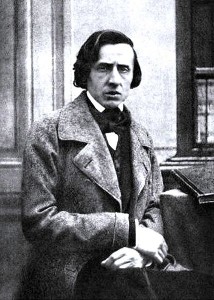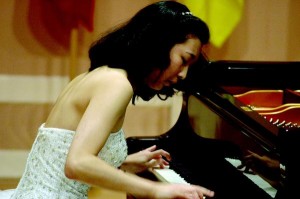
Celebrating Chopin, as 200th Birthday Nears
Frederic Chopin, photographed in 1849, the year of his death.
The next few years in the world of classical music are replete with bicentennial anniversaries of the births of several composers whose music fills much of the core repertory: Robert Schumann and Frederic Chopin (1810); Franz Liszt (1811); Richard Wagner and Giuseppe Verdi (1813). Look for a good deal of programming that memorializes these anniversaries, and for concert presenters to do much reviving of lesser-known material, particularly in the case of Liszt.
But of all those composers, the one whose work will need the least reviving will be Chopin. Unlike virtually any other composer of the canon, almost all of Chopin’s music is in the active repertory, played and studied and heard every single day, everywhere around the world. About the only things that get overlooked are the songs (beautiful though they are), the early C minor sonata, the Piano Trio, some of the early cello pieces, the abortive third concerto (Allegro de Concert), and lovely pieces for piano and orchestra such as the Krakowiak (Op. 14).
This week, University of Miami research musicologist Frank Cooper Jr. began a five-part series of talks called Chopin and the Romantic Tide, given at UM’s Clarke Recital Hall as a non-credit course for interested persons. He started Monday with a look at Chopin’s dance-form music — polonaises, mazurkas and waltzes — and plans to discuss his chamber music, sonatas, etudes, preludes and works with orchestra in the weeks ahead.
Cooper told me Tuesday that 64 people had come to the first lecture in the series, which costs $150 for all five. I asked him the reasons for Chopin’s apparent unquenchable popularity.
“I think there are three reasons,” Cooper said. “First, he is an agreeable confector of good melodies. These were melodies based on Italian models — he loved bel canto opera — and those kinds of melodies are what came naturally to him.”
Second is his much-discussed use of rubato, which is basically the art of playing with strict tempo for expressive purposes. “That holds the audience’s attention,” Cooper said, comparing the effect to watching the wind play with a field of grass: the grass is all rooted in the same place, but the movement of the grass varies widely as the wind blows over it. “That tiny deviation means that you can’t beat time to it, and that makes people pay attention.”
Finally, there’s the fact that Chopin didn’t write any large-scale works such as opera and symphony. “Most of his forms are small, and the audience attention span is not strained,” Cooper said.
Cooper also said that Chopin’s music is much more complex than he is usually given credit for, grouping him with Schumann as one of the great free-contrapuntists of the 19th century. Look at the very first Prelude (Op. 28, No. 1, in C major), he said: “When you look at the score and you try to clarify it, you find an amazing array of inner lines,” Cooper said. “He didn’t need to do that, but he wanted to show he could do counterpoint.”
Cooper’s lectures, which include live and recorded performances, continue for the next four Mondays (call 305-284-2241 to register, and ask for Sylvia Swaine).

Pianist Clare Huangci.
In addition, the Chopin bicentenary is being marked by the Chopin Foundation of the United States, based in Miami, which will host the eighth national Chopin Competition from Feb. 20-28 at the Miami-Dade County Auditorium. The group also is presenting a series of pianists in October, November, April, May and June, in free concerts at the Broward County Main Library in downtown Fort Lauderdale and the Granada Presbyterian Church in Coral Gables.
The free Chopin concerts begin with the 18-year-old American pianist Claire Huangci on Oct. 3 and 4; this recent Curtis student will play Beethoven’s Waldstein Sonata and the Ferruccio Busoni arrangement of Bach’s Chaconne in D minor, originally for solo violin, on a program that also includes the Chopin Berceuse, Sonata No. 2 in B-flat minor, and the Polonaise in A-flat, Op. 53 (Heroic) J.S. Bach’s Partita No. 2 (in C minor, BWV 826), Beethoven’s Rage Over a Lost Penny, and six works by Chopin: the etudes in A minor (Op. 10, No. 2) and G-sharp minor (Op. 25, No. 6), the Berceuse (Op. 57), the Polonaise in A-flat, Op. 53 (Heroic), the Sonata No. 3 in B minor (Op. 58), and the magnificent Polonaise-Fantaisie, Op. 61.
In November, the Polish pianist Magdalena Baczewska offers a program of Bach and Chopin that will feature an early fugue and contradance by Chopin, the great C-sharp minor Prelude (Op. 45), the Andante Spianato and Grande Polonaise, Op. 22, and the Second Sonata. Those concerts are set for Nov. 7 and 8.
It’s good to see these tributes to the 200th birthday of the great Polish master, who lived such a short life — he was 39 when he died in 1849, of tuberculosis or perhaps cystic fibrosis — and contributed so much to the world of music in that brief time. It’s an astonishing legacy that continues to amaze and enlighten.